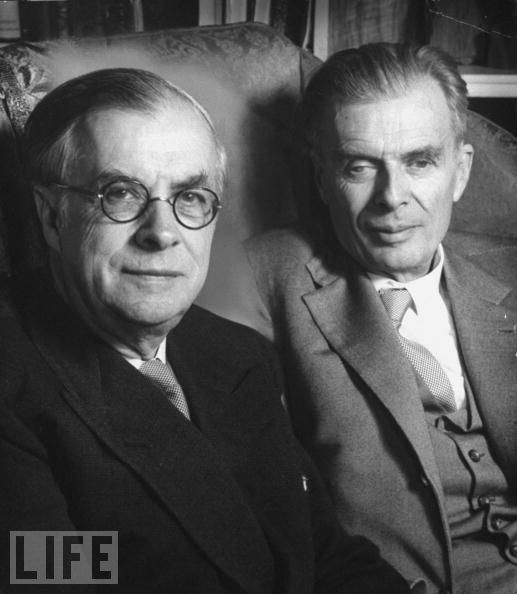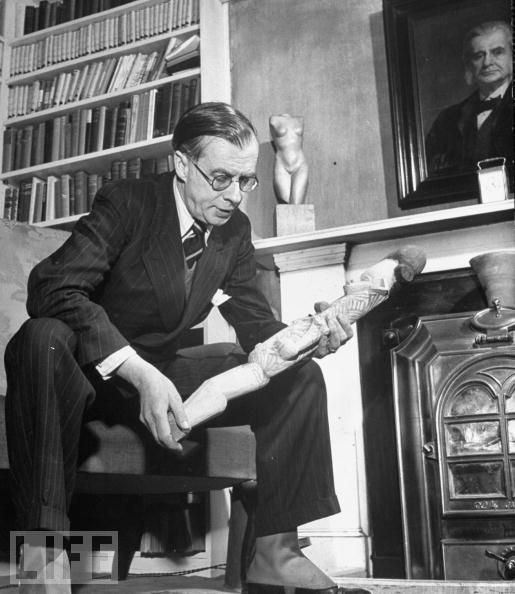<Back to Index>
- Biologist Julian Sorell Huxley, 1887
- Author Erich Maria Remarque, 1898
- Field Marshal of the Luftwaffe Robert Ritter von Greim, 1892
PAGE SPONSOR
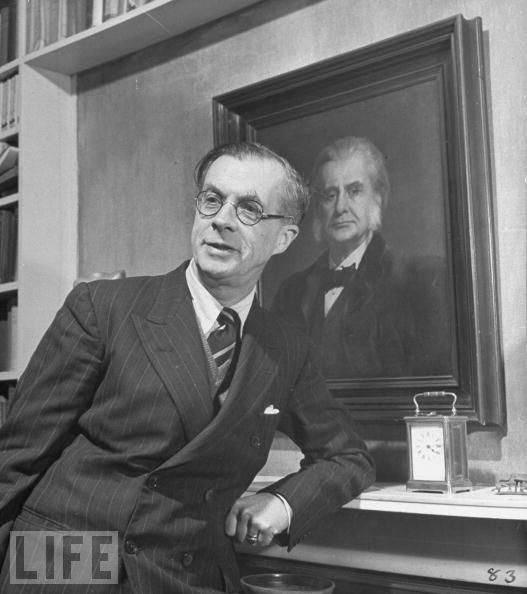
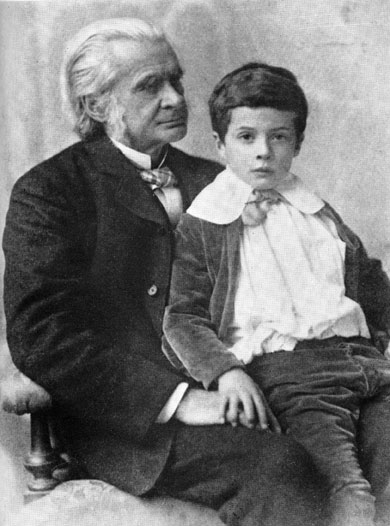
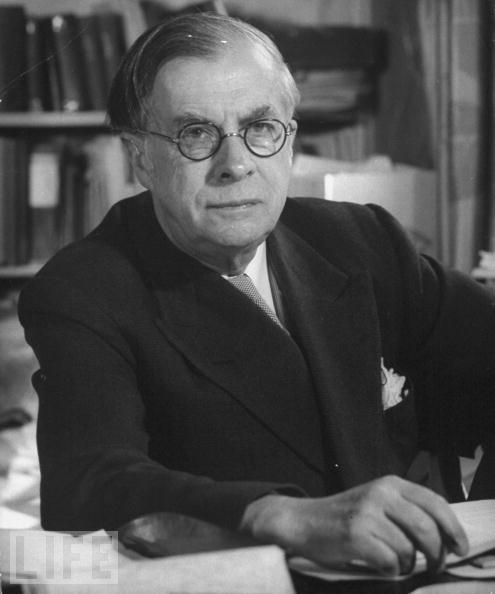
Sir Julian Sorell Huxley FRS (22 June 1887 – 14 February 1975) was an English evolutionary biologist, humanist and internationalist. He was a proponent of natural selection, and a leading figure in the mid twentieth century evolutionary synthesis. He was Secretary of the Zoological Society of London (1935 – 1942), the first Director of UNESCO, and a founding member of the World Wildlife Fund.
Huxley
was well known for his presentation of science in books and articles,
and on radio and television. He was awarded UNESCO's Kalinga Prize for the popularisation of science in 1953, the Darwin Medal of the Royal Society in 1956, and the Darwin – Wallace Medal of the Linnaean Society in 1958. He was also knighted in that same year, 1958, a hundred years after Charles Darwin and Alfred Russel Wallace announced the theory of evolution by natural selection. In 1959 he received a Special Award of the Lasker Foundation in the category Planned Parenthood – World Population. Huxley was a prominent member of the British Eugenics Society, and its President from 1959 – 1962. Huxley came from the distinguished Huxley family. His brother was the writer Aldous Huxley, and his half brother a fellow biologist and Nobel laureate, Andrew Huxley; his father was writer and editor Leonard Huxley; and his paternal grandfather was Thomas Henry Huxley, a friend and supporter of Charles Darwin and proponent of evolution. His maternal grandfather was the academic Tom Arnold, great-uncle poet Matthew Arnold and great-grandfather Thomas Arnold of Rugby School.
Huxley was born on June 22, 1887, at the London house of his aunt, the novelist Mary Augusta Ward, while his father was attending the jubilee celebrations of Queen Victoria. Huxley grew up at the family home in Surrey, England, where he showed an early interest in nature, as he was given lessons by his grandfather, Thomas Henry Huxley. When he heard his grandfather talking at dinner about the lack of parental care in fish, Julian piped up with "What about the stickleback, Gran'pater?" Also, according to Julian himself, his grandfather took him to visit J.D. Hooker at Kew.
At the age of thirteen Huxley attended Eton College as a King's Scholar,
and continued to develop scientific interests; his grandfather had
influenced the school to build science laboratories much earlier. At
Eton he developed an interest in ornithology, guided by science master
W.D. 'Piggy' Hill. "Piggy was a genius as a teacher... I have always
been grateful to him." In 1905 Huxley won a scholarship in Zoology to Balliol College, Oxford.
In 1906, after a summer in Germany, Huxley took his place in Oxford, where he developed a particular interest in embryology and protozoa. In the autumn term of his final year, 1908, his mother died from cancer at only 46: a terrible blow for her husband, three sons and young eight year old daughter Margaret. In 1909 he graduated with first class honours, and spent that July at the international gathering for the centenary of Darwin's birth, held at the University of Cambridge. Also, it was the fiftieth anniversary of the publication of the Origin of species.
Huxley got a scholarship to spend a year at the Naples Marine Biological Station where he developed his interest in developmental biology by investigating sea squirts and sea urchins. In 1910 he was appointed as Demonstrator in the Department of Zoology and Comparative Anatomy at Oxford University, and started on the systematic observation of the courtship habits of water birds such as the Common Redshank (a wader) and grebes (which are divers). Bird watching in childhood had given Huxley his interest in ornithology, and he helped devise systems for the surveying and conservation of birds. His particular interest was bird behaviour, especially the courtship of water birds. His 1914 paper on the Great Crested Grebe, later published as a book, was a landmark in avian ethology; his invention of vivid labels for the rituals (such as 'penguin dance', 'plesiosaurus race' etc.) made the ideas memorable and interesting to the general reader.
In 1912 his life took a new turn. He was asked by Edgar Odell Lovett to take the lead in setting up the new Department of Biology at the newly created Rice Institute (now Rice University) in Houston, Texas,
which he accepted, planning to start the following year. Huxley made an
exploratory trip to the USA in September 1912, visiting a number of
leading universities as well as the Rice Institute. At T.H. Morgan's fly lab (Columbia University) he invited H.J. Muller to
join him at Rice. Muller agreed to be his deputy, hurried to complete
his PhD and moved to Houston for the beginning of the 1915 – 1916
academic year. At Rice, Muller taught biology and continued Drosophila lab work. Before taking up the post of Assistant Professor at the Rice Institute, Huxley spent a year in Germany preparing for his demanding new job. Working in a laboratory just months before the outbreak of World War I,
Huxley overheard fellow academics comment on a passing aircraft "it
will not be long before those planes are flying over England". In 1913
Huxley had a nervous breakdown after the break-up of his relationship with 'K', and
rested in a nursing home. His depression returned the next year, and he
and his brother Trevenen (two years his junior) ended up in the same
nursing home. Sadly, Trevenen hanged himself. Depressive illness had afflicted others in the Huxley family. One pleasure of Huxley's life in Texas was the sight of his first hummingbird, though his visit to Edward Avery McIlhenny's estate on Avery Island in
Louisiana was more significant. The McIlhennys and their Avery cousins
owned the entire island, and the McIlhenny branch used it to produce
their famous Tabasco sauce.
Birds were one of McIlhenny's passions, however, and around 1895 he had
set up a private sanctuary on the Island, called Bird City. There
Huxley found egrets, herons and bitterns.
These water birds, like the grebes, exhibit mutual courtship, with the
pairs displaying to each other, and with the secondary sexual
characters equally developed in both sexes. In September 1916 Huxley returned to England from Texas to assist in the war effort, working in the British Army Intelligence Corps, first in Sussex, and then in northern Italy. After the war he became a Fellow at New College, Oxford, and
was made Senior Demonstrator in the University Department of Zoology.
In fact, Huxley took the place of his old tutor Geoffrey Smith, who had
been killed in the battle of the Somme on the Western Front. In 1919 Huxley married Juliette Baillot. She was a French Swiss girl whom he had met at Garsington Manor, the country house of Lady Ottoline Morrell, a Bloomsbury Group socialite
with a penchant for artists and intellectuals. The newly weds' life
together included students, faculty wives, grebes and, unfortunately,
another depressive breakdown, this time rather serious. From his wife's
autobiography it seems his mental illness took the form of a bipolar disorder,
with the depressive phases being of moderate to severe intensity. It
took a long time for him to recover on this occasion, but despite this
he left a legacy of students who admired him, and who became leaders in
zoology for the next thirty or forty years. E.B. Ford always remembered his openness and encouragement at the start of his career.
In 1925 Huxley moved to King's College London as Professor of Zoology, but in 1927, to the amazement of his colleagues, he resigned his chair to work full time with H.G. Wells and his son G.P. Wells on The Science of Life.
For some time Huxley retained his room at King's College, and continued
as Honorary Lecturer in the Zoology Department. From 1927–31 he was also Fullerian Professor of Physiology at the Royal Institution,
where he gave an annual lectures series. No-one realised it at the
time, but he had come to the end of his life as a university academic.
In 1929, after finishing work on The Science of Life, Huxley visited East Africa to advise the Colonial Office on education in British East Africa (for the most part Kenya, Uganda and Tanganyika). He discovered that the wildlife on the Serengeti plain was almost undisturbed because the tsetse fly (the vector for the trypanosome parasite which causes sleeping sickness in humans) prevented human settlement there. He tells about these experiences in Africa view (1931), and so does his wife. She
reveals that he fell in love with an 18-year old American girl on board
ship (when Juliette was not present), and then presented Juliette with
his ideas for an open marriage: "What Julian really wanted was... a
definite freedom from the conventional bonds of marriage." The couple
separated for a while; Julian traveled to the USA, hoping to land a
suitable appointment and, in due course, to marry Miss Weldmeier. He
left no account of what transpired, but he was evidently not
successful, and returned to England to resume his marriage in 1931. For
the next couple of years Huxley still angled for an appointment in the
USA, without success. As
the 1930s started, Huxley travelled widely and took part in a variety
of activities which were partly scientific and partly political. In
1931 Huxley visited the USSR at the invitation of Intourist,
where initially he admired the results of social and economic planning
on a large scale. Later, back in the United Kingdom, he became a
founding member of the think tank Political and Economic Planning. In the 1930s Huxley visited Kenya and other East African countries to see the conservation work, including the creation of national parks, which was happening in the few areas that remained uninhabited due to malaria. From 1933 – 38 he was a member of the committee for Lord Hailey's Africa Survey. In 1935 Huxley was appointed Secretary to the Zoological Society of London, and spent much of the next seven years running the society and its zoological gardens, the London Zoo and Whipsnade Park, alongside his writing and research. The previous Director, Peter Chalmers Mitchell,
had been in post for many years, and had skillfully avoided conflict
with the Fellows and Council. Things were rather different when Huxley
arrived. Huxley was not a skilled administrator; his wife said "He was
impatient... and lacked tact". He
instituted a number of changes and innovations, more than some approved
of. For example, Huxley introduced a whole range of ideas designed to
make the Zoo child friendly. Today, this would pass without comment;
but then it was more controversial. He fenced off the Fellows' Lawn to
establish Pets Corner; he appointed new assistant curators, encouraging
them to talk to children; he initiated the Zoo Magazine. Fellows
and their guests had the privilege of free entry on Sundays, a closed
day to the general public. Today, that would be unthinkable, and
Sundays are now open to the public. Huxley's mild suggestion (that the
guests should pay) encroached on territory the Fellows thought was
theirs by right. In
1941 Huxley was invited to the United States on a lecturing tour, and
generated some controversy by saying that he thought the United States
should join World War II: a few weeks later came the attack on Pearl Harbor.
When the USA joined the war, he found it difficult to get a passage
back to the UK, and his lecture tour was extended. The Council of the
Zoological Society — "a curious assemblage... of wealthy amateurs,
self-perpetuating and autocratic" —
uneasy with their Secretary, used this as an opportunity to remove him.
This they did by the rather unpleasant tactic of abolishing his post
"to save expenses". Since Huxley had taken a half salary cut at the
start of the war, and no salary at all whilst he was in America, the
Council's action was widely read as a personal attack on Huxley. A
public controversy ensued, but eventually the Council got its way. In
1943 he was asked by the British government to join the Colonial
Commission on Higher Education. The Commission's remit was to survey the West African Commonwealth countries for suitable locations for the creation of universities. There he acquired a disease, went down with hepatitis, and had a serious mental breakdown. He was completely disabled, treated with ECT, and took a full year to recover. He was 55. Huxley,
a lifelong internationalist with a concern for education, got involved
in the creation of the United Nations Educational, Scientific and Cultural Organization (UNESCO),
and became the organization's first Director - General in 1946. His term
of office, six years in the Charter, was cut down to two years at the
behest of the USA delegation. The
reasons are not known for sure, but his left wing tendencies and
humanism were likely factors. In practice, his lack of religious
affiliation was a positive strength, as was his wide range of
international interests and contacts. His brief tenure of office was
generally regarded as dynamic and successful. In a fortnight he dashed
off a 60-page booklet on the purpose and philosophy of UNESCO,
eventually printed and issued as an official document. There were,
however, many conservative minded opponents of his scientific humanism.
His idea of restraining population growth with birth control was
anathema to both the Catholic Church and the Comintern/Cominform.
In its first few years UNESCO was dynamic and broke new ground; since
Huxley it has become larger, more bureaucratic and stable. The personal and social side of the years in Paris are well described by his wife. Huxley's internationalist and conservation interests also led him, with Victor Stolan, Sir Peter Scott, Max Nicholson and Guy Mountfort, to set up the WWF (World Wide Fund for Nature under its former name of the World Wildlife Fund). Another post war activity was Huxley's attack on the Soviet politico - scientist Trofim Lysenko, who had espoused a Lamarckian heredity, made unscientific pronouncements on agriculture, used his influence to
destroy classical genetics in Russia and to move genuine scientists
from their posts. In 1940, the leading botanical geneticist Nikolai Vavilov was
arrested, and Lysenko replaced him as director of the Institute of
Genetics. In 1941, Vavilov was tried, found guilty of 'sabotage' and
sentenced to death. Reprieved, he died in jail of malnutrition in 1943.
Lysenko's machinations were the cause of his arrest. Worse still, Lysenkoism not only denied proven genetic facts, it stopped the artificial selection of
crops on Darwinian principles. This may have contributed to the regular
shortage of food from the Soviet agricultural system (Soviet famines). Huxley, who had twice visited the Soviet Union, was originally not anti-communist, but the ruthless adoption of Lysenkoism by Joseph Stalin ended his tolerant attitude. Lysenko ended his days in a Soviet mental hospital, and Vavilov's reputation was posthumously restored in 1955. In the 1950s Huxley played a role in bringing to the English speaking public the work of the French Jesuit palaeontologist Pierre Teilhard de Chardin,
whom he believed had been unfairly treated by the Catholic and Jesuit
hierarchy. Both men believed in evolution, but differed in its
interpretation as de Chardin was a Christian, whilst Huxley was an unbeliever. Huxley wrote the forward to The Phenomenon of Man (1959) and was bitterly attacked by his rationalist friends for doing so. On Huxley's death at 87 in 1975, John Owen (Director of National Parks for Tanganyika)
wrote "Julian Huxley was one of the world's great men... he played a
seminal role in wild life conservation in [East] Africa in the early
days... [and in] the far reaching influence he exerted [on] the
international community". In addition to his international and humanist concerns, his research interests covered evolution in all its aspects, ethology, embryology, genetics, anthropology and to some extent the infant field of cell biology. Julian's eminence as an advocate for evolution, and especially his contribution to the new evolutionary synthesis, led to his awards of the Darwin Medal of the Royal Society in 1956, and the Darwin – Wallace Medal of the Linnaean Society in 1958. 1958 was the centenary anniversary of the joint presentation On the tendency of species to form varieties; and the perpetuation of varieties and species by natural means of selection by Darwin and Wallace. Huxley was a friend and mentor of the biologists and Nobel laureates Konrad Lorenz and Niko Tinbergen, and taught and encouraged many others. In general, he was more of an all-round naturalist than his famous grandfather, and
contributed much to the acceptance of natural selection. His outlook
was international, and somewhat idealistic: his interest in progress
and evolutionary humanism runs through much of his published work.
